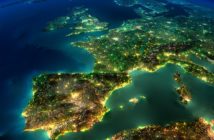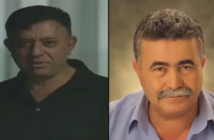OSLO—The Nobel Peace Prize will be awarded in a few hours here in the Norwegian capital. A legacy of Swedish businessman and inventor Alfred Nobel, the nobility of its aim, to reward those who strive for peace, is seldom questioned, given that the answer seems evident. Of course we should choose peace over war, life over death. But let’s take the inquiry further: What kind of peace is desirable, and how do we achieve it?
The misuse of the word “peace” in foreign policy has often made it an empty slogan used for political purposes. “Peace for our time” was the justification in 1930s Europe to appease and bolster a wicked regime that plunged the world into the bloodiest war in history. Peace can be found in cemeteries filled with the dead, and in dungeons crammed with political prisoners. While peace is, in fact, the ultimate end, a peace prompted by fear is illusory; it is weak, and it is momentary.
To answer, “why peace?” we must define a meaningful peace—one that’s not just the absence of war. We must separate naked détente—for example, China’s relationship with North Korea, Morocco’s with Algeria, or what the United States had with the Soviet Union—from the lasting, peaceful bond enjoyed by modern France and Germany, the U.S. and Canada, and even South Korea and Japan. Open and developed societies such as these, that trade freely and depend on one another, do not fight each other. As long as they remain internally free nations with power residing in the people, they shall never go to war against one another.
History has shown this to be the only ironclad law of political theory. Meanwhile, autocracies—whether democratically-elected or brought to power by force—are always at war, often with a foreign power and always with their own people. One thing is certain—autocracies will always be in conflict—even if nobody were to call it that. Meaningful peace is built on individual rights and the rule of law—not ceasefires.
In the Northern Caucasus, as of this writing, Chechnya is said to be “at peace” with Russia. After assassinating most of the legitimate government of Chechnya, the Russian leader Vladimir Putininstalled a puppet government. The Chechen strongman, Ramzan Kadyrov has “brought peace” between the two nations, after almost 400,000 Chechens (including more than 40,000 children) were killed in the conflict. Today, this peace involves the Kadyrov government engaging in daily war against the citizens of Chechnya, who wish to have elections, freedom of speech, due process, and other inalienable rights. There is no peace in Chechnya, no matter how often these tactics are repeated. For the Chechen people there is still war, torture, disappearances, sex-slavery for disobedient women, certain death for sexual minorities, and absolute impunity for those who commit these atrocities.
Similarly, my birthplace, Venezuela is “at peace” with Colombia, yet its elected government of 13 years has a long history of financing the FARC terrorist rebels of Colombia. Internally, the Venezuelan president, Hugo Chavez, persecutes whoever disagrees with him. Reporters who criticize are persecuted; judges who issue unpalatable rulings are jailed; politicians who wish to compete in the electoral process are disqualified on dubious charges. Political violence against peaceful student demonstrators is both permissible and often publicly encouraged by the president himself. Venezuela is not “at peace.” The government is at war with those who wish to be free. There is no meaningful peace in or with Venezuela The same occurs to a similar extent in Nicaragua, Ecuador, Bolivia, Panama, and most egregiously, Cuba.
In Africa there are so many instances. The continent is filled with countries, for example Ethiopia and Sudan, or Cameroon and Equatorial Guinea, ostensibly at peace with each other but at war against their own people. The continent’s history is littered with killing fields. The Middle East, in the throes of ongoing revolutions, is a test case—those nations that become liberal democracies that respect individual rights can be counted on to never wage war on other liberal democracies or their own citizens.
Meaningful peace is never based on coercion between nations. It is based on open international communication, and problem-solving through non-violent channels. Such a network can only exist when its individual pieces are free.
How do we get there? It follows that the leaders of free nations must repudiate realpolitik and statecraft based on narrow national interests. There can be no ‘make-nice’ with one dictatorship while criticizing others for similar crimes. China, for instance, must be an isolated pariah for its ruthless and criminal war on hundreds of millions of its own people—as well as the nations it occupies: the Uyghurs and the Tibetans. The free world barely criticized Egypt’s dictator, Hosni Mubarak, because he said the right things about Israel and the U.S.—while waging a war inside his country (all the while looting it to the tune of $50 billion). Meanwhile, Bashir al-Assad, the Syrian tyrant, is frequently assailed in the West for committing the very same crimes against his people. Foreign policy must recognize that meaningful peace will only be achieved when nation states are liberal democracies, and this necessitates using one and only one standard when promoting freedom.
Of course, liberal democracies vary widely, from constitutional monarchies with parliamentary systems to presidential republics that elect leaders using proportional representation. No matter their differences, they all thrive on a commitment to the individual’s freedom from state aggression. Distinguishing between ‘free’ and ‘unfree’ countries is not difficult. In 2004, former Russian political prisoner Natan Sharansky proposed the “town square test.” According to Sharansky, “If a person cannot walk into the middle of the town square and express his or her views without fear of arrest, imprisonment, or physical harm, then that person is living in a fear society, not a free society.”
So what is to be done about unfree or partially-free nations? If we are to achieve meaningful peace, the foreign policy of free governments and the cultural export of free societies must: help build civil society, establish rule of law, secure individual freedoms, spark economic development, separate religion and government, secure freedom of thought and belief, and expose human rights violations. Not only governments should be depended on to promote this—individuals in civil societies can and should become involved in this process, both by petitioning their own governments and by establishing peer-to-peer networks with people in unfree nations. Artists to artists, engineers to engineers, veterans to veterans.
The value of breaking your government’s monopoly on foreign policy cannot be discounted. For instance, veterans of the United States can connect veterans of Russia’s armed forces much better than a bureaucrat from the State Department can engage in public diplomacy through embassy-sponsored events. In the Czech Republic one unstoppable Norwegian woman, Bela Gran Jensen, invited children at her school to reach out directly to children in countries at war. Children made greeting cards and sold them to buy toys and medical supplies for children in Serbia. This effort slowly picked up pace as more schools and more children began doing the same. The group took on the name Centipede Children. Since it began, the Centipede Movement has spread to Slovakia, Poland, Norway, and Canada, with a total of more than 2,500 schools The Centipede Children didn’t wait for their political leaders—they did it themselves. And it wasn’t long before NATO commanders asked Jensen to speak on the subject of civil society.
Government is, however, essential as the foundation for peace, because peace must at times be secured with force. The painful lessons of the Holocaust, Cambodia’s killing fields, and the more recent genocides in Rwanda and Bosnia attest to this unfortunate reality. As a result, concepts such as “just war,” “humanitarian intervention,” and most recently the “responsibility to protect” have emerged to legalize collective military force, in order to stop mass atrocities such as genocide. In 2011, when Libyan dictator Muammar Gaddafi began to slaughter citizens clamoring for freedom, he was stopped in his tracks after the international community recognized their responsibility to protect. Slowly, even internal wars are being discussed and addressed by free nations. This may be the arc of history, but it is a long one and will take several generations.
Pressuring autocrats to liberalize while assisting democratic forces inside closed societies should be high priorities for anyone promoting meaningful peace. And what a glorious peace world history has revealed meaningful peace to be! The greatest advances in the most important sectors—medicine, education, commerce, technology, and economics—occur in this free and open peace. If we want true, lasting, and meaningful peace, we are obliged to secure individual rights and liberty, not just truces and ceasefires.
Thor Halvorssen is president of the New York-based Human Rights Foundation and founder and CEO of the Oslo Freedom Forum.
![]()







